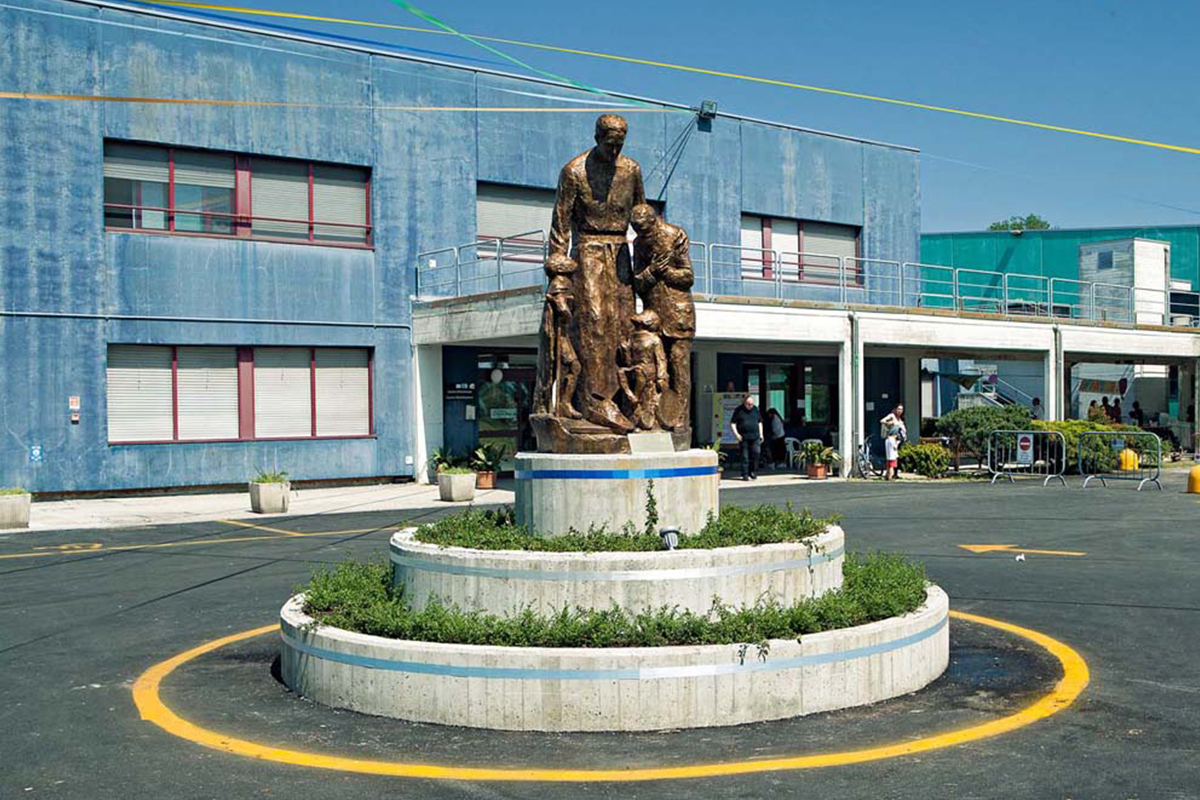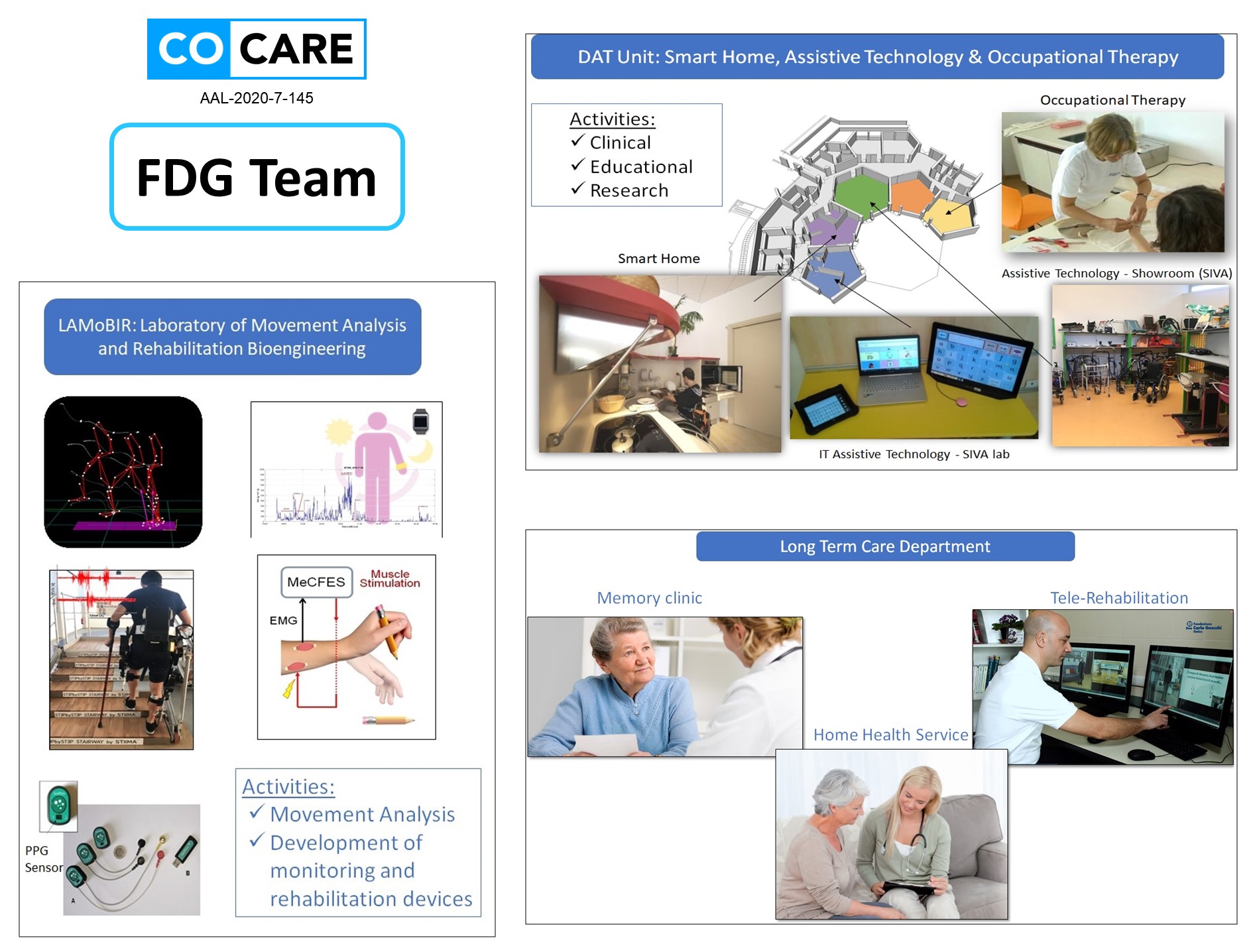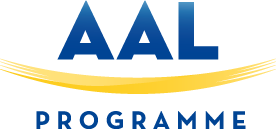Meet the Partners: Fondazione Don Gnocchi
The FDG team is made up of different professional figures belonging to three laboratories/operative units.
- LAMoBIR (IRCCS S. Maria Nascente, Milan)
- DAT Unit (IRCCS S. Maria Nascente, Milan)
- Long Term Care Department (Palazzolo Institute, Milan)
About LAMoBIR
LAMoBIR (Laboratory of Movement Analysis and Rehabilitation Bioengineering) collects the wealth of the scientific research activities developed by the Bioengineering Center founded in 1976 as part of the collaboration between FDG and the Polytechnic of Milan for the implementation of interdisciplinary research programs concerning biomedical technologies. LAMoBIR is a research laboratory aimed at the development and clinical application of advanced technologies for rehabilitation. In particular, LAMoBIR focuses on the instrumental analysis of motor, cognitive, cardiovascular and respiratory functions, in order to (1) deepen the knowledge on human behavior in physiological conditions and in the presence of neurological, musculoskeletal and/or cardio-respiratory pathologies, (2) improve the diagnostic-functional framework, (3) help in defining tailored therapeutic-rehabilitative approaches, and (4) measure therapeutic outcomes. In addition, LAMoBIR deals with the development of software for the advanced analysis of biosignals and of devices for monitoring and rehabilitation that are used by the clinician (e.g. biofeedback systems and robotic systems) or directly by the patient (orthoses, prostheses, functional electrical stimulation systems, wearable sensors). Dr. Eng. Maurizio Ferrarin, who has expertise in rehabilitation engineering and motion analysis, is the Head the laboratory and is Responsible of the Research Line on Technology for Rehabilitation. In addition to his position at FDG, he is adjunct professor at the University of Milan.
About DAT Unit
The DAT Unit (Smart Home, Assistive Technology and Occupational Therapy) offers clinical services of education to autonomy to users with motor and cognitive disabilities of all ages. The Unit includes: (1) a smart (domotic) home, that is a real apartment equipped with a high level of automation, which allows users to try, in the various domestic environments, technologically advanced devices and aids aimed at recovering the maximum possible autonomy; (2) the SIVALab whose aims are the introduction of innovative assistive technologies in clinical and social assistance services, and the carrying out of training and dissemination activities about this topic; (3) an Occupational Therapy service whose main objective is to support patients by promoting participation in daily life activities also by adapting objects or environments; (4) the SOL DIESIS clinic for motor rehabilitation of musicians. The DAT Unit also participates in research projects, conducting technological (verifying existing or innovative technologies), clinical (measuring the effectiveness of treatments) and organizational (experimenting innovative intervention methods and protocols) experiments. Dr. Rosa Maria Converti, physiatrist and harpist, is the Head of the Unit.
About Long Term Care Department
The Long Term Care Department includes three clinical and research areas; (1) a Memory Clinic focused on geriatric, neurological and neuropsychological assessment, and on the provision of psychotherapy services for caregivers of people with dementia; (2) a Home Health Service specialized in basic personal assistance, nursing and medical assistance and rehabilitation in the home environment; (3) a Tele-Rehabilitation Service providing clinical assessments to create the care plan, and remote sessions of cognitive/motor stimulation for people with dementia, orthopedic and neurodegenerative diseases. Dr. Raffaele Benaglio, medical doctor, is the medical responsible of the department.
Role in COCARE
For the COCARE project, the FDG team will participate, as lead group, to WP2 “User Requirements and Needs” by organizing and conducting the focus groups with primary (elderly) and secondary (healthcare-professionals) end-users in Italy. FDG will participate, as collaborating group, to WP3 “System and Concept Development” and WP4 “Testing and Evaluation” by conducting the usability study and the field trials on elderly subjects. FDG will also participate to WP5 by disseminating the results through conference presentations and scientific publications.


